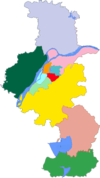
The Taiping Rebellion,also known as the Taiping Civil War or the Taiping Revolution,was a civil war in China between the Manchu-led Qing dynasty and the Hakka-led Taiping Heavenly Kingdom. The conflict lasted for 14 years,from its outbreak in 1850 until the fall of Taiping-controlled Nanjing—which they had renamed Tianjing "heavenly capital"—in 1864. However,the last rebel forces were not defeated until August 1871. Estimates of the conflict's death toll range between 20 and 30 million people,representing 5–10% of China's population at that time. While the Qing ultimately defeated the rebellion,the victory came at a great cost to the state's economic and political viability.
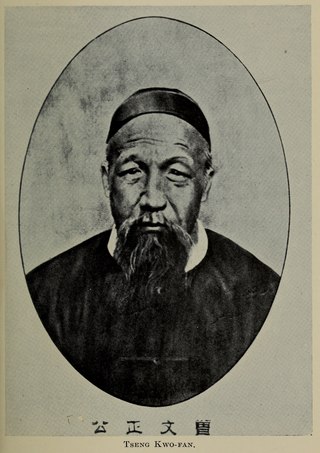
Zeng Guofan,Marquis Yiyong,birth name Zeng Zicheng,courtesy name Bohan (伯涵),was a Chinese statesman and military general of the late Qing dynasty. He is best known for raising and organizing the Xiang Army to aid the Qing military in suppressing the Taiping Rebellion and restoring the stability of the Qing Empire. Along with other prominent figures such as Zuo Zongtang and Li Hongzhang of his time,Zeng set the scene for the Tongzhi Restoration,an attempt to arrest the decline of the Qing dynasty. Zeng was known for his strategic perception,administrative skill and noble personality on Confucian practice,but also for his ruthlessness in repressing rebellions.
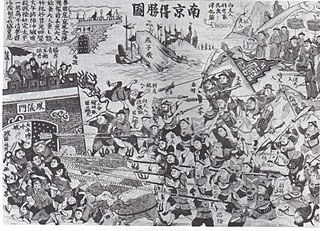
The Third Battle of Nanjing in 1864 was the last major engagement of the Taiping Rebellion in the Qing Empire. With the fall of Nanjing,the capital of the Taiping Heavenly Kingdom,the rebellion came to an end. The Hunan Army,an unpaid and barely fed militia commissioned by the Qing Empire,lost all their discipline and committed mass-scale random murder,wartime rape,looting and arson against the civilians of Nanjing,seen as "rebels". 200,000–300,000 "rebels" were reported dead by Zeng Guofan,the commander-in-chief of the Hunan Army.
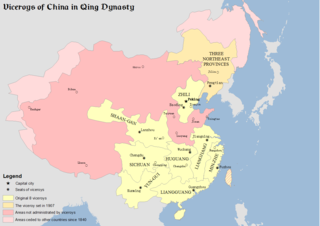
Zongdu were the managers supervising provincial governors in Ming and Qing China. One viceroy usually administered several provinces and was in charge of all affairs of military,food,wages,rivers,and provincial governors within their region of jurisdiction. Viceroys was appointed by and directly reported to the Emperor.

The Presidential Palace in Nanjing,Jiangsu,China,housed the Office of the President of the Republic of China from 1927 until the capital was relocated to Taipei in 1949. It is now a museum called the China Modern History Museum. It is located at No.292 Changjiang Road,in the Xuanwu District of Nanjing.

The Viceroy of Liangjiang,fully named in Chinese as the Governor-General of the Two River Provinces and Other Local Admirals,in Charge of Military Affairs,Food and Wages,Management of Rivers,and Administration on Nanhe Affairs,was one of eight regional Viceroys during the Qing dynasty. The Viceroy of Liangjiang had jurisdiction of military,civil,and political affairs over then Jiangnan Province and then Jiangxi Province. The position was set up in 1647 and abolished in 1912.
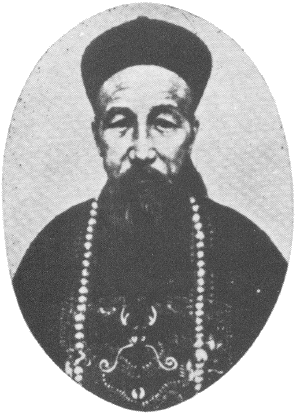
The Xiang Army or Hunan Army was a standing army organized by Zeng Guofan from existing regional and village militia forces called tuanlian to contain the Taiping Rebellion in Qing China. The name is taken from the Hunan region where the Army was raised. The Army was financed through local nobles and gentry,as opposed to through the centralized Manchu-led Qing dynasty. The army was mostly disbanded by Zeng after the re-capture of the Taiping capital at Nanking.

Zeng Guoquan,courtesy name Yuanfu,art name Shuchun,was a Chinese official and military leader of the late Qing dynasty. He was the ninth brother of Zeng Guofan,a prominent statesman and general,and a descendant of the philosopher Zengzi. He served in the Xiang Army,a standing military force organised by his brother to counter the Taiping rebels,and was nicknamed "Ninth Marshal" (九帥). He was known for his expertise in siege warfare,particularly the use of trenches,hence he was also nicknamed "Zeng the Iron Container" (曾鐵桶). During the conquest of Tianjing (Nanjing),the capital of the Taiping Heavenly Kingdom,Zeng was notorious for condoning massacres of the city populace,which resulted in him being called "Zeng the Butcher" (曾屠戶).
Zhang Guoliang,born in Guangdong,was a Field Marshal for the Qing dynasty. He was born in Gaoyao,Zhaoqing,Guangdong,although Qing stated that he was from Meixian,Guangdong. He was originally a bandit in Guangxi but later joined the Qing Army. He helped to raise the Green Standard Army to 250,000 to fight against the Taiping Rebellion. In the second rout of Army Group Jiangnan in 1860 he was defeated by Li Xiucheng. Zeng Guofan praised Zhang and said he was Jiangnan's "Great Wall of China."
Jiangnan Daying or the Jiangnan Battalion;was an army group assembled by the Qing dynasty. The army group consist of mostly Green Standard Army,and their goal was to quell the Taiping Rebellion around the Jiangnan region. The army group twice encircled Nanjing,the capital of the Taiping Heavenly Kingdom,but were defeated by the Taiping forces on both occasions.
The Battle of Jiangnan (1860),also known as the Second rout of the Jiangnan Battalion took place between the Qing government's Green Standard Army and the army of the Taiping Heavenly Kingdom during the Taiping Rebellion. The Green Standard Army twice attempted to besiege Nanjing,capital of the Taiping Heavenly Kingdom,but was unable to break through. To break the siege of Nanjing,the Taiping forces maneuvered to divert Qing forces by sacking Hangzhou,before quickly moving back to Nanjing to counter-encircle the Qing siege forces and routing the Green Standard Army garrison completely,breaking the siege of Nanjing.

The Taiping Heavenly Kingdom,or the Heavenly Kingdom of Great Peace (1851–1864),was a theocratic absolute monarchy which sought to overthrow the Qing dynasty. The Heavenly Kingdom,or Heavenly Dynasty,was led by Hong Xiuquan. Its capital was at Tianjing,present-day Nanjing. The unsuccessful war it waged against the Qing is known as the Taiping Rebellion.

Zhan Garden is a Chinese garden located on No. 128 Zhan Yuan Road,beside Fuzimiao,Nanjing,Jiangsu,China.

The Taiping Heavenly Kingdom is a Chinese television series based on the events of the Taiping Rebellion and the rise and fall of the Taiping Heavenly Kingdom in the late Qing dynasty. The 48-episode series was first broadcast on CCTV in China in 2000. The series was also broadcast on STAR Chinese Channel in Taiwan and on ATV in Hong Kong.

The Battle of Anqing (安慶之戰) was a prolonged siege of the prefecture-level city of Anqing in Anhui,China,initiated by Hunan Army forces loyal to the Qing Dynasty against the armies of the Taiping Heavenly Kingdom. The siege began in September 1860 and ended on September 5,1861,when imperial forces under the command of Zeng Guoquan breached the walls of the city and occupied it.
Events from the year 1860 in China.
Events from the year 1862 in China.
Events from the year 1863 in China.
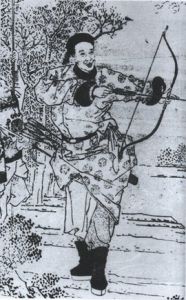
Taqibu,courtesy name Zhiting,member of the Tao Jia clan,a native of Manchuria's Bordered Yellow Banner,was promoted to the rank of retainer in his early years as an officer of the guards. Thereafter,he was expatriated to Hunan as a guerrilla. During this period,Taqibu's military talents were discovered by Zeng Guofan,and thus began to make a name for himself. On the recommendation of Zeng Guofan,Taqibu participated in the formation of the Hunan army and became Zeng Guofan's right-hand man. In the war with the Taiping Heavenly Kingdom,Taqibu led his troops to defeat the Taiping Army in Xiangtan,Yuezhou,Wuchang,and so on,and he was promoted to provincial military commander of Hunan,granted the title of Khatun Batulu Yong,and the position of riding lieutenant. In the war with the Taiping Heavenly Kingdom,Taqibu led his troops to defeat the Taiping Army in Xiangtan,Yuezhou,Wuchang,and so on,and he was promoted to governor of Hunan,granted the title of Khatun Batulu,and the position of cavalry lieutenant. Soon,Wuchang lost to the hands of the Taiping army,in the Qing army began to counterattack,the eve of the attack on Jiujiang,Taqibu died of illness due to exhaustion in the camp,the Qing court posthumously awarded the third-class lieutenant position.

Xu Garden,also known by its Chinese name of Xuyuan,Xu Yuan,or Xuyuan Garden,is a Chinese garden in Slender West Lake National Park in Hanjiang District,Yangzhou,China. It is particularly noted for its views and for the interior woodwork of its pavilions.

















